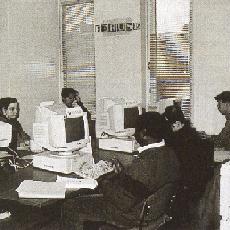![]()

Students at the PERUSE workstations |
As well as being Canada's first medical library, McGill's Health Sciences Library was the first in Canada to gain access to Medline, the computer-based system developed by the United States National Library of Medicine, giving students, clinicians and researchers speedy access to information contained in the journal literature. In 1973 Medline indexed information on articles in about 1,200 of the most significant journals in medicine and now offers access to over 3,500. Through an agreement with the National Science Library of Canada and a generous grant from the McConnell Family Foundation, McGill was able to install a Medline terminal on February 19, 1973.
Looking back it was extraordinarily slow, the terminal was huge and noisy and, because cross-border data exchange was not possible, a regular telephone line to Plattsburg, New York connected it to the National Library of Medicine in Washington. It was a breakthrough, however, and users from many faculties soon took advantage of the service. These days, McGill offers access to Medline and many other data bases through the PERUSE system and over the Internet.

|